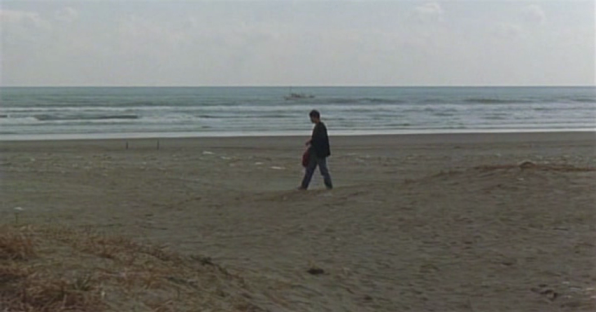Even with an opening act that Rivette would remake many times over in spirit (the gamey hunt for an elusive figure whose actions have layed down trajectories for the others / but does he even exist?) and a middle sequence involving a dark hotel room and a note slid under a door that matches the quiet menace of anything Lewton or Lang would do in the decade, still the most striking thing about When Strangers Marry is it's insistence that the outlandish happenings of it's insular melodrama occur within a vital, bustling, breathing world. Tracking shots that fluidly incorporate peripheral working stiffs, and extended asides into lively public spaces that make no pretense of narrative import; again and again moments are sprinkled in that lie entirely outside of the story being told, at once lending a potent quotidian contrast to the central cloud of violence and uncertainty, while also providing a larger context into which the blood that's spilt must inevitably flow.
Castle's visual style here is never less than entirely arresting, yet the most effective shot in the entire movie may be one of the simplest: a malevolent, downward gaze directly into the camera from Mitchum. Not only because of what it conveys about the character with such chilling simplicity, but also because it feels like nothing short of the birth of Harry Powell right before your eyes.
_____________________________________________________
"Both formally and thematically, Kurosawa Kiyoshi's films are a series of fluctuations between rigid and chaotic elements, grids in which emphasis is placed variously on the lines and the spaces. The lines: the hard angles of his long-take shots, sectioning the screen in balanced but asymmetric compositions; the confines of genre; the habitual codes of consensual reality. The spaces: unexpected activations of seemingly static planes or elements within those strict compositions; pushing generic considerations to a larger, allegoric frame of reference, then beyond to ambiguous apocalypse in which an old order/means of perception is abolished in an act of either nihilism triumphant or possibility affirmed - or maybe both, an affirmative nihilism."
- B. Kite, "A Kurosawa Kiyoshi Kit"
"It is nonsense to argue over whether giant monsters or dead people are scarier. How good or bad a film is isn't dependent simply on how scary it is. I just want to give the generic name "horror films" to that family of films that take as their subject matter the fear that follows one throughout one's life.....Now that I think about it, since there are no works that have failed to change my life even a little bit, all films are horror films."
- Kiyoshi Kurosawa, "What is Horror Cinema?"

























1 comment:
WHEN STRANGERS MARRY was a major highlight of the William Castle Festival I saw two years ago at the Film Forum. That Mitchum gaze was indeed unforgettable, and the fun house sequence one of the best Castle ever filmed. It's a shame he was never given the opportunity to follow-up on this audacious work, instead become a niche director who still managed in that capacity some most memorable excursions. Great post, Drew!
Post a Comment